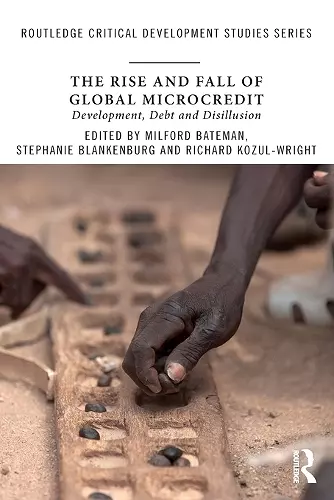The Rise and Fall of Global Microcredit
Development, debt and disillusion
Richard Kozul-Wright editor Milford Bateman editor Stephanie Blankenburg editor
Format:Paperback
Publisher:Taylor & Francis Ltd
Published:10th Sep '18
Currently unavailable, and unfortunately no date known when it will be back
This paperback is available in another edition too:
- Hardback£145.00(9781138714083)

In the mid-1980s the international development community helped launch what was to quickly become one of the most popular poverty reduction and local economic development policies of all time. Microcredit, the system of disbursing tiny micro-loans to the poor to help them to establish their own income-generating activities, was initially highly praised and some were even led to believe that it would end poverty as we know it. But in recent years the microcredit model has been subject to growing scrutiny and often intense criticism. The Rise and Fall of Global Microcredit shines a light on many of the fundamental problems surrounding microcredit, in particular, the short- and long-term impacts of dramatically rising levels of microdebt.
Developed in collaboration with UNCTAD, this book covers the general policy implications of adverse microcredit impacts, as well as gathering together country-specific case studies from around the world to illustrate the real dynamics, incentives and end results. Lively and provocative, The Rise and Fall of Global Microcredit is an accessible guide for students, academics, policymakers and development professionals alike.
"This book provides a definitive, and much-needed, assessment of the microcredit movement: from the overselling of its modest initial promise, to its conversion into a new method of exploiting vulnerable people and communities, and to its misconceived embrace by global leaders and institutions. What cements this book’s importance for development policy and practice is that its critique is accompanied by an affirmation of the role of productive, accessible financing in sustainable development." -- Gary Dymski, Professor of Applied Economics, Leeds University Business School, UK
"This is a must-read book to understand the financialisation of the poor from the perspective of the global microcredit industry. The Post-2015 Agenda, supporting financial and digital inclusion to achieve development and to end with poverty, hides the profit obtained by microcredit institutions when granting credit to small entrepreneurs and to those with fewer resources. The problem with indebtedness and lack of payment of loans affects the poor, causing greater debt in crisis and recession periods. This provides important evidence and insight into what went wrong with microcredit." -- Alicia Girón, University Program of Asian and African Studies, UNAM, Mexico
"This unfailingly courageous and carefully researched book shatters the mythology around the microcredit myth that has captured the imagination and funding of the global development industry for far too long. It shines a bright light on the links between microcredit and rising indebtedness and financialised, rentier capitalism. Microcredit boosters take heed!" -- Ilene Grabel, Josef Korbel School of International Studies, University of Denver, USA
"This book provides the inconvenient truth about how market-based mechanisms are far from panaceas for today’s development problems. With rigorous detail, the volume parades through case after case of failed micro-credit ventures in country after country—even in Peru the ‘center of origin’ for many of the financialization of the poor [this] has more often than not led to yet another case of the further transfer of wealth and power from the poor." -- Kevin P. Gallagher, Director at the Global Development Policy Center, Frederick S. Pardee School of Global Studies, Boston University, USA
ISBN: 9781138714120
Dimensions: unknown
Weight: 460g
290 pages